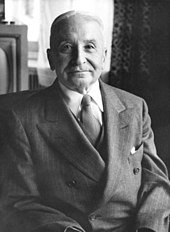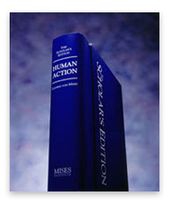Human action
Human Action: A Treatise on Economics (1949) is the main work of the Austrian economist Ludwig von Mises , originally published in 1940 under the title Economics, Theory of Action and Economics .
Emergence

After arriving in Geneva in 1934, as a professor at the Geneva University Institute for International Studies , Mises had the financial security for the first time to devote himself fully to research. He wanted to develop his previous work and that of the Vienna School into a complete, self-contained theory of human action.
Mises believed that an incomplete understanding of human behavior was the cause of flawed economic theories. He counted all forms of state interventionism among them ; in the long run these would lead to socialism and economic disasters. He also saw his task as being to comprehensively demonstrate the fundamental flaws of socialism and state interventionalism.
The result of this work was published in German in 1940 under the title Economics, Theory of Action and Economics . However, the Second World War prevented the work from being distributed and the Swiss publisher had to file for bankruptcy. In US exile , he prepared an English-revision for the American market, which in 1949 under the title Human Action - A Treatise on Economics at Yale University Press published.
content
The entire work is pervaded by Mises' praxeological approach: Influenced by Kant , other propositions are deduced as true on the basis of some synthetically a priori recognizable axioms and theorems . From the outset , von Mises considers evidence or refutation through experience to be impossible for epistemological reasons. On the one hand, in agreement with Karl Popper , he turns against the historicism that was prevalent in Germany at the time , and on the other hand against the simplification of economic relationships through game theory , statistical methods or mathematical models such as in neoclassicalism and Keynesianism .
Human Action consists of seven main parts:
- Part One: Human Action
- Part Two: Actions Within the Framework of Society
- Part Three: Economic Calculation
- Part Four: Catallactics or Economics of the Market Society
- Part Five: Social Cooperation Without a Market
- Part Six: The Hampered Market Economy
- Part Seven: The Place of Economics in Society
reception
Human Action has now been printed in four editions and sold more than 500,000 times. It has been translated into eight languages.
The American journalist Henry Hazlitt , himself a supporter of the Austrian school, wrote of Human Action :
“[It is] a landmark in the progress of economics. [...] Human Action is, in short, at once the most uncompromising and the most rigorously reasoned statement of the case for capitalism that has yet appeared. If a single book can turn the ideological tide that has been running in recent years so heavily toward statism, socialism, and totalitarianism, Human Action is that book. It should become the leading text of everyone who believes in freedom, individualism, and in the ability of a free-market economy not only to outdistance any government-planned system in the production of goods and services for the masses, but to promote and safeguard [...] those intellectual, cultural, and moral values upon which all civilization ultimately rests. "
“[It is] a milestone in the advancement of economics. […] 'Human Action' is, in short, the most uncompromising and at the same time the most consistently thought-out representation of the cause of capitalism that has appeared so far. If a single book can change the prevailing ideological opinion that has turned so much to étatism , socialism and totalitarianism in recent years , then 'Human Action' is that book. It should be the authoritative text for everyone who believes in freedom , individualism and the free market economy and this not only in the production of goods and services for broad sections of the population, but also in their promotion and protection for those spiritual, cultural and moral values , which form the foundations of every civilization, is superior to planned economy systems. "
The vast majority of economists have not yet received human action .
See also
literature
expenditure
- Ludwig von Mises : Economics: Theory of Action and Economics . Economy and Finance, Geneva 1940, ISBN 3-87881-172-1 ( mises.org [PDF; 47.9 MB ] Facsimile of the first edition).
- Ludwig von Mises: Human Action: A Treatise on Economics (Scholars Edition) . Ludwig von Mises Institute, Auburn (Alabama) 2007, ISBN 978-0-945466-24-6 ( mises.org [PDF; 53.2 MB ] Reprint of the first edition.).
- Ludwig von Mises: Human Action: A Treatise on Economics . Ed .: Bettina Bien Greaves. 4th edition. Liberty Fund Inc., Auburn (Alabama) 2007, ISBN 978-0-86597-631-3 ( mises.org [PDF; 11 kB ]).
Secondary literature
- Jörg Guido Hülsmann : Mises: The Last Knight of Liberalism . Ludwig von Mises Institute, Auburn (Alabama) 2007, ISBN 978-1-933550-18-3 , pp. 883-945 .
- Robert Murphy: Human Action Study Guide . Ludwig von Mises Institute, Auburn (Alabama) 2008, ISBN 978-1-933550-38-1 ( mises.org [PDF; 731 kB ]).
- Joseph T. Salerno : The Place of Mises's Human Action in the Development of Modern Economic Thought . In: The Quarterly Journal of Austrian Economics . Vol. 2, 69, Spring, 1999, ISSN 1936-4806 , pp. 117–125 ( mises.org [PDF; 116 kB ]).
- Frank H. Knight : Professor Mises and the Theory of Capital . In: Economica . Vol. 8, No. 32 , November 1941, p. 409-427 .
- Vernon L. Smith : Reflection on Human Action After 50 Years . In: Cato Journal . tape 19 , no. 2 , 1999, ISSN 0273-3072 , p. 195–214 ( cato.org [PDF; 82 kB ]).
Individual evidence
- ↑ Edward W. Younkins : Mises, Friedman and Rand: A Methodological Comparison quebecoislibre.org
- ^ Ludwig von Mises: A Treatise on Economics. 4th edition, p. 116: "There is not the slightest analogy between playing games and the conduct of business within a market society."
- ^ Ludwig von Mises: A Treatise on Economics. 4th edition, pp. 350–352: "Statistics (...) is not economics and cannot produce economic theorems and theories."
- ^ Roderick T. Long: Realism and Abstraction in Economics: Aristotle and Mises versus Friedman. ( mises.org PDF).
- ↑ Jörg Guido Hülsmann : Passionate thinker against the almighty state - On the 30th anniversary of Ludwig von Mises' death. In: Criticón . No. 180 , 2003, p. 23-26 ( mises.de ).
- ^ Henry Hazlitt : The Case for Capitalism . In: Newsweek . tape 34 , September 1949, p. 70 sqq .
- ↑ Gregory Mankiw on 'Human Action'.
